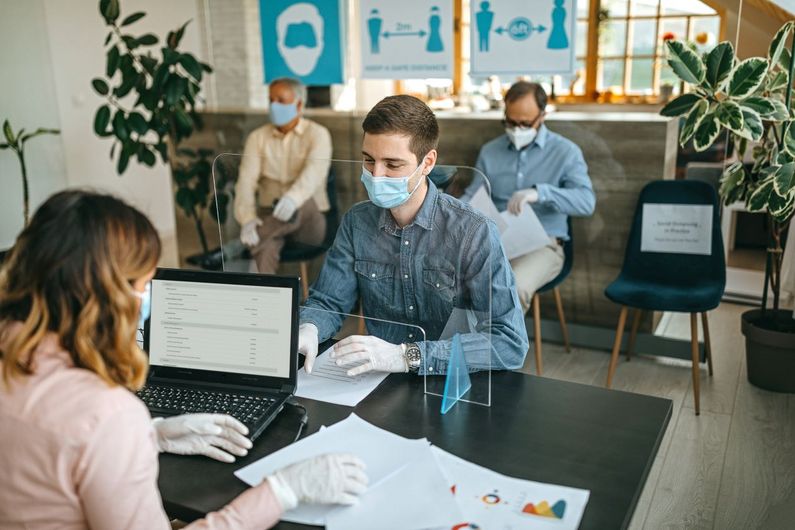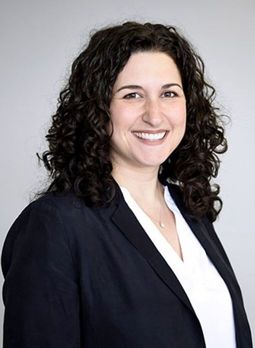A post-COVID-19 research clinic welcomes its first patients
- Salle de presse
02/23/2021
- UdeMNouvelles
Led by UdeM infectious-diseases specialist Emilia Liana Falcone, a multidisciplinary team at the Montreal Clinical Research Institute will look at long-term complications affecting COVID-19 survivors.
The Montreal Clinical Research Institute (IRCM) has opened a new research clinic to study the after-effects of COVID-19 on patients diagnosed with the disease and examine complications they suffer over the long term.
Led by IRCM researcher and Université de Montréal infectious-diseases specialist Emilia Liana Falcone, the clinic’s multidisciplinary team at the IRCM Post-COVID-19 (IPCO) clinic began seeing their taking first patients Feb. 12.
“While most of the research since the start of the pandemic has focused on treatments and the immediate impact of the infection, we wanted to get a better grasp on the disease as a whole,” said Falcone, an assistant clinical professor in UdeM’s Department of Medicine.
“Our aim with the IPCO clinic is to evaluate our patients’ health following infection, to better understand COVID-19 and to help them manage lingering symptoms.”
Patients enrolled at IPCO will be followed for one year and will go through a series of tests to provide data on the possible effects of the disease and early detection of anomalies. Results will help tackle fundamental questions tied to the current pandemic and ensure a more rapid response to future ones.
“There are many questions we want to ask to help better understand the virus and inform clinical decision-making in the long-run,” said Falcone.
Among them:
- Are survivors protected against re-infection or are they still at risk of recurrence?
- Do patients with certain medical conditions such as heart disease, diabetes and inherited immune defects present a higher risk for severe complications?
- What are the symptoms patients experience in the months following a diagnosis, and can these be prevented or treated?
- Is there any connection between disease severity in the acute phase of the infection and long-term complications?
“The IPCO research clinic is perfectly suited to the overall mission of the IRCM Clinic in which we combine clinical care with research questions,” said Rémi Rabasa-Lhoret, the IRCM’s vice president of clinic and clinical research.
“When Dr. Falcone came to us with her project, it was an obvious natural fit. We hope to learn more about COVID-19 through the research we will conduct as well as help patients who currently have nowhere else to turn for help in managing their symptoms.”
It is still unclear what causes certain symptoms to linger in “long-haul patients.” Commonly-experienced symptoms include intense fatigue, body aches, shortness of breath, headaches, difficulty sleeping and concentrating, and others.
“There is still so much we do not know about COVID-19 and what causes some patients to experience long-term symptoms that can have seriously affect their daily life, evn months after diagnosis,” said Falcone. “This can be very distressing: people expect to get back to their old selves again but are unable to, due to an unexplained illness or what some might call an invisible disability.”
In addition to studying effects on patients, the IPCO clinic will establish a biobank of clinical samples from COVID-19 survivors to encourage collaborations with outside researchers and help answer some of these pressing questions more efficiently.
About the IPCO research clinic
IPCO is part of the IRCM Clinic affiliated with the Centre hospitalier de l’Université de Montréal (CHUM) that combines specialized clinical care and medical research. The IRCM Clinic is multidisciplinary: specialists work with nurses, nutritionists, kinesiologists and clinical research teams to treat patients and help bridge the gap between their care and the research that’s done in the Institute’s laboratories. IPCO is funded by Quebec’s Ministère de la Santé et des Services sociaux, Ministère de l’Économie et de l’Innovation and the Fonds de recherche du Québec – santé (FRQS). For details and to enrol in the study, go to https://ircm.qc.ca/en/covid.
About the IRCM
Founded in 1967, the Institut de recherches cliniques de Montréal (IRCM) / Montreal Clinical Research Institute is a non-profit organization that conducts fundamental and clinical biomedical research in addition to training high-level young scientists. With its cutting-edge technology facilities, the Institute brings together 33 research teams working in cancer, immunology, neuroscience, cardiovascular and metabolic diseases, systems biology and medicinal chemistry. The IRCM also operates a research clinic specialized in hypertension, cholesterol, diabetes and cystic fibrosis, as well as a research centre on rare and genetic diseases in adults. The IRCM is affiliated with Université de Montréal and associated with McGill University. Its clinic is affiliated with the Centre hospitalier de l’Université de Montréal (CHUM). The IRCM is supported by the Ministère de l’Économie, de la Science et de l’Innovation (Quebec Department of Economy, Science and Innovation).
Media contact
-
Jeff Heinrich
Université de Montréal
Tel: 514 343-7593














